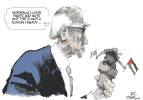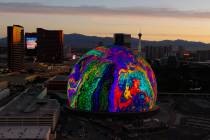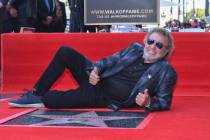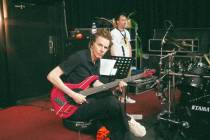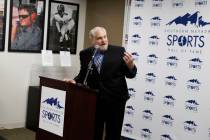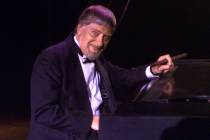Black Sabbath exploring roots at MGM Grand Garden
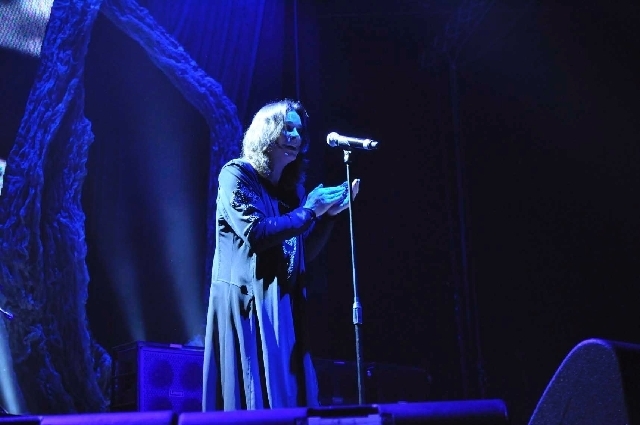
It all began with that bell, tolling in a thunderstorm somewhere, definitely at night, its ominous, foreboding clang suggestive of rain-slicked tombstones, black masses beneath moonless skies and a bunch of gargoyles doing gargoyle stuff.
It signified the birth of heavy metal, a sound that would instantaneously become synonymous with the derisive snort of music snobs, the disapproving tongue clucks of parental units and the tearing of sleeves from jean jackets the world over.
Forty-three years later, its ring can be heard again, this time at the end of an album instead of the beginning.
The record in question is “13,” the first new studio disc that metal patriarchs Black Sabbath have cut with original singer Ozzy Osbourne since 1978’s misleadingly titled “Never Say Die!”
The last song on the standard version of the album, “Dear Father,” a vengeful plodder that somewhat clumsily addresses sexual abuse by clergymen by rhyming “theocracy” with “hypocrisy” and such, finishes with the same sound snippet that opened the title track from Black Sabbath’s eponymous 1970 debut.
Decades later, that funereal dirge still conjures plenty of gooseflesh with haunting guitar lines, lyrics that reference a mysterious figure in black who — spoiler alert! — turns out to be Satan and Osbourne’s signature cries of “oh no-o-o-o-o,” voiced with such true, convincing terror that it chills the blood, approximating the sensation of being trapped in a meat locker for, oh, about a week.
By overtly referencing the song on “13,” Sabbath seems to be trying to make up for lost time by ignoring the passing of time altogether. Sabbath has crafted an album that deliberately and very conspicuously recalls its origins, way back when it was essentially a more bombastic blues band with sheepdog coifs and the reefer-abetted goal of becoming the rock ’n’ roll equivalent of a horror film.
In pursuit of this end, Sabbath became the first metal group, the cornerstone of the genre. Sabbath may have been preceded by other hard-rock acts, most notably Led Zeppelin, which some mistakenly label a metal band, but Sabbath was different: Its songs were darker, more simply arranged and bludgeoning, like the business end of a meat cleaver. The band struck a perfect balance between groove and girth, between menace and winking, self-aware mischief.
The bands that followed in Sabbath’s wake, like fellow British pioneers like Iron Maiden and Judas Priest, added histrionics and, in the case of the latter, a whole lot of leather, fleshing out the sound and creating a culture around it.
But Sabbath has always remained the essence of heavy metal, its DNA distilled.
It’s these roots that the band excavates on “13.”
To hear Osbourne tell it, it was producer Rick Rubin who urged the group to revisit the days when it was still rocking bell-bottoms in photo shoots.
“He says, ‘Forget all the other albums. I want you to concentrate and zone into the vibe that you had on the first album,’ ” Osbourne says during a recent conference call with journalists, recalling working with Rubin. “For a long, long time I was like, ‘What is he talking about?’ Between Sabbath and my own solo career, I’ve made some pretty interesting albums over the years, so why is this guy going back to Day One? He goes, ‘Look, don’t think heavy metal.’ I’m going, ‘Well, what the hell would you call the first album, then?’ And he goes, ‘A Black Sabbath album.’ ”
And so Sabbath’s past is present throughout “13.”
Along with “Dear Father,” lead-off track “Beginning of the End” recalls “Black Sabbath” both in its deliberate, slow-building pace and portentous guitar figures; “Zeitgeist” re-creates the mellow, cosmic vibe of “Planet Caravan,” complete with similar-sounding hand drums; “Damaged Soul” comes flecked with harmonica playing reminiscent of “The Wizard”; several tunes come peppered with Osbourne’s “N.I.B.”-worthy shouts of “oh yeah!”
Of course, when a band decides to make a record intended to underscore its legacy as opposed to advance it, there’s going to be a been-there-done-that feel to it.
As such, “13,” comes across as something of a placeholder, a solid, de rigueur effort where the band plays to its well-established strengths (monolithic riffs that dwarf their surroundings like a mountain range does the valley below) while also reminding us of their weaknesses (namely bassist Geezer Butler’s occasionally daffy lyrics).
Still, it’s taken some time to get to this point.
Sabbath reconvened its original lineup back in 1997, touring off and on until 2005, and in that time, the band tried to compose a new album.
“I was doing this television thing with ‘The Osbournes’ back then, I had my own career, and I suppose it was a clash of egos. It just didn’t feel right,” Osbourne says. “We recorded a demo, with a bunch of stuff, which is nothing like the way we used to do. We were forcing it out of ourselves, whereupon this album just kind of came out — we just clicked. I mean, you know when you’re in a band and you go into something which is working. It just came naturally.”
It also came without original drummer Bill Ward, who vented publicly about his unhappiness with the contract he was offered to return to the band and declined to participate. Rage Against the Machine drummer Brad Wilk was subsequently recruited to play on “13” (for live shows, Ozzy Osbourne Band drummer Tommy Clufetos joins the group).
Nevertheless, “13” debuted atop the Billboard Top 200 album chart, earning the band its first No. 1 record after all these years.
And so some things have changed for these dudes.
Just not their calendars.
“We didn’t try to be, like, the modern version of Sabbath,” Osbourne says. “We just did what we always did.”
Contact reporter Jason Bracelin at jbracelin@reviewjournal.com or 702-383-0476.
Preview Black Sabbath 7:30 p.m. Sunday MGM Grand Garden arena, 3799 Las Vegas Blvd. South $46.05-$142.95 (800-745-3000)






